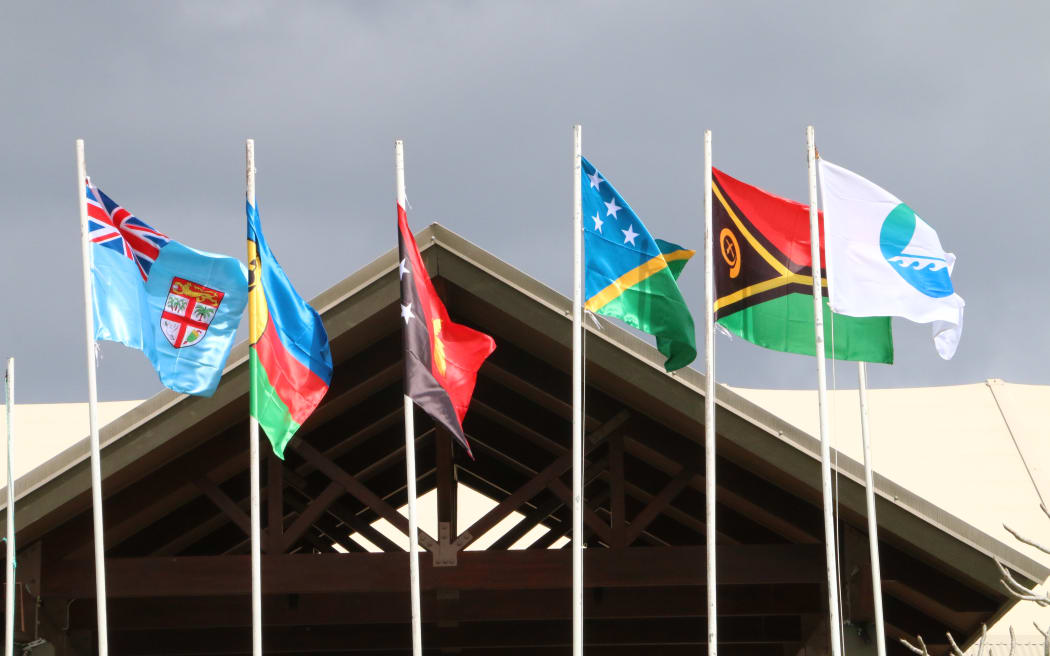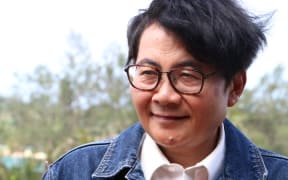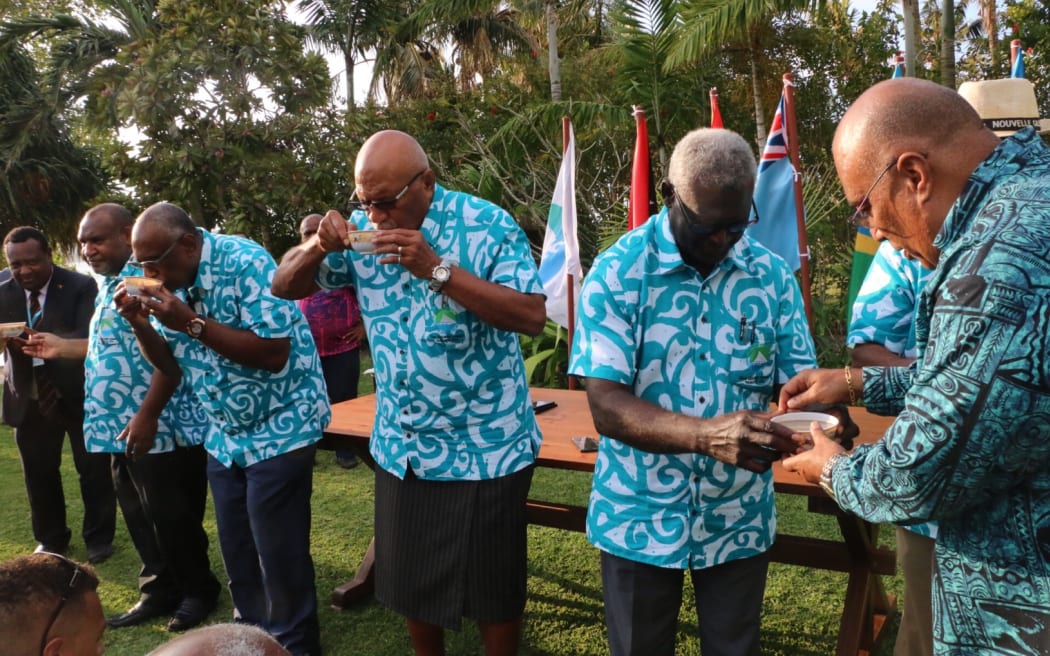By Koroi Hawkins, RNZ Pacific editor
A Radio New Zealand journalist says an Indonesian government official attempted to bribe and intimidate him at last month’s 22nd Melanesian Spearhead Group leaders’ summit in Port Vila.
The Indonesian government has responded yesterday saying it would “surely look” into the claims.
RNZ journalist Kelvin Anthony was in Port Vila to cover the MSG Leaders’ Summit two weeks ago when he was offered “a gift” after an exclusive interview with Indonesia’s Ambassador to Australia, Dr Siswo Pramono.
The alleged bribe was offered between 1pm-1.10pm on Wednesday, August 23, in the carpark of the Holiday Inn Resort in Port Vila by Indonesian government representative Ardi Nuswantoro, Anthony said.
“I was offered an exclusive interview with the Indonesia’s Ambassador to Australia at the MSG meeting after being told earlier in the week by Ardi Nuswantoro that his government did not like what RNZ had published on West Papua and that it was not balanced,” he said.
“I advised the delegate that RNZ makes every effort to be balanced and fair and we want to get Indonesia’s side too, but we need the chance to speak on the record.”
After communicating face-to-face and online via WhatsApp — texts and call records seen by RNZ — Nuswantoro asked Anthony to visit the Holiday Inn Resort at 12pm for the interview on Wednesday, August 23.
Broad set of questions
“I interviewed Dr Pramono covering a broad set of questions including human rights issues in West Papua, the MSG meeting, and Jakarta’s intentions in the Pacific, which lasted over 40 minutes,” Anthony said.
“I thought I had an exclusive interview that went well for a strong story out of the meeting that touched sensitive but pertinent issues involving Indonesia, the West Papua issue, and the Pacific.”
Anthony said he was escorted out of the reception area at the end of the interview and accompanied by at least three Indonesian officials.
He said Nuswantoro, who he was liaising with to set up the interview, “asked me several times if I had a car and how I was going to get back”.
“I told them that my colleague from a local media who was with me was driving me back to town. As we walked to the car park, the same official continued to walk with me and just as we were about to approach the car, he said, ‘The Indonesian delegation would like to offer you token of appreciation’.”
“I asked him, ‘What’s that?’ He replied, ‘A small gift’.
“I asked him again, ‘But what is it?’ And he replied: ‘Money’.
‘I was shell-shocked’
“At that point I was shell-shocked because I had never experienced something like that in my career.
“I declined to accept the money and told him, ‘I cannot take money because it compromises the story and my credibility and integrity as a journalist’.”
Anthony said the Indonesian official looked visibly withdrawn at the rejection and apologised for offering money.
Due to the incident, RNZ chose at the time not to air the interview with Dr Pramono.
RNZ put the claims of bribery and intimidation to the Indonesian government.
In an email response, Jakarta’s Ministry of Foreign Affairs, Asia Pacific and African Affairs director general Abdul Kadir Jailani neither confirmed nor denied the claims.
“Bribery has never been our policy nor approach to journalists,” Jailani said.
“We will surely look into it,” he said.

‘I felt intimidated’
The offering of money happened while a local fixer was about five metres away “seeing everything unfold” waiting at the car, Anthony said.
“My local fixer saw and heard everything and as we drove off he said I should report on it but only when I am out of Vanuatu. I immediately communicated the incident to my superiors back in Wellington to put everything on record,” Anthony said.
The local ni-Vanuatu journalist, who was present when the alleged incident occurred, said: “I saw what was happening and knew exactly what the Indonesian guy was trying to do”.
“My advice to the RNZ journalist was to hold the story until he was out of the country because I was worried about his safety.”
RNZ has seen communications sent by the Indonesian official to the journalist, asking him when RNZ was going to publish the interview.
“I did not respond to the messages or calls. I did, however, encounter the Indonesia delegation representatives and the official who offered me the money on Thursday, August 24, at the closing reception of the MSG leaders’ meeting at the Warwick Resort Convention Centre,” Anthony said.
Official kept following him
He said the same official kept following him around and messaged him a video clip showing indigenous Papuans carrying out violent acts.
“I felt a little intimidated but I tried to stick around with the local journalists as much as I could so I could avoid the Indonesian officials coming up to me,” he said.
Another local media representative who was at the farewell function on Thursday, August 24, said they could “see the Indonesian delegate moving around the RNZ journalist continuously and following him everywhere he went”.
“It seemed obvious that one particular Indonesian delegate was pestering Kelvin and following him around,” they said.
In Indonesia’s official response to the allegations, Abdul Kadir Jailani said “we have no interest in following nor intimidating any journalists covering the Summit”.
MSG meeting coverage
RNZ was the only international media which had a journalist on the ground to cover the MSG meeting for its Pacific audience.

The MSG is an important sub-regional bloc that includes Fiji, FLNKS — the Kanak and Socialist Liberation Front, an umbrella group for pro-independence political parties in New Caledonia — Papua New Guinea, Solomon Islands and Vanuatu.
The meeting had a packed agenda and the issue of full membership of the United Liberation Movement for West Papua (ULMWP) was a big-ticket item.
Indonesia, an associate member of the MSG, had the largest delegation at the meeting and has been on record saying it does not support or recognise the ULMWP as a representative body of the indigenous Papuans.
Dr Pramono said Jakarta views the ULMWP as a “secessionist movement” and walked out of the meeting when the movement’s representatives made interventions.
The MSG meeting concluded with leaders rejecting ULMWP’s application to become a full member of the sub-regional group.
This article is republished under a community partnership agreement with RNZ.

Article by AsiaPacificReport.nz





